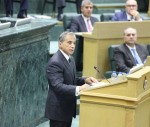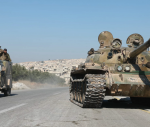You are here
‘Bad news for Turkey, this region and the international community’
Nov 04,2015 - Last updated at Nov 04,2015
The victory of the Justice and Development Party (AKP) of Turkish President Recep Tayyip Erdogan in Sunday’s parliamentary elections is bad news for Turkey, this region and the international community.
This win is bad news for Turkey because in five months, the AKP managed to capture enough votes to gain another four-year term of single party rule at the expense of democracy.
The fundamentalist AKP took votes from the right-wing Nationalist Movement Party (MHP) and the leftist People’s Democratic Party (HDP), while the secular Republican People’s Party (CHP) managed to marginally improve its position.
The AKP secured just under 50 per cent of the vote, giving it 317 seats in the 550-member parliament. However, the AKP did not win the 367 seats that would have enabled Erdogan to make constitutional changes transforming the system of governance from parliamentary to presidential, or enough seats to take the issue to referendum.
Therefore, for Erdogan to achieve his ambition to make this change and become Turkey’s first executive president, the AKP will have to either convince deputies from other parties to support the change or poach deputies from other parties.
The MHP, which lost votes to the AKP, is the most likely target of such efforts.
Erdogan, who is meant to be a ceremonial president but instead dominates the government and parliament, will now pull out all the stops to secure his objective.
If he follows the trend he established in recent years, he is certain to become increasingly authoritarian and impatient with any attempts to stymie, cross or criticise him.
This means a new AKP government will continue to carry out policies that sow division, discord and dissidence in the society and country.
The most serious of these is the war against the Kurdish Workers Party (PKK), relaunched after the June election that left the AKP without a majority and unwilling to make concessions necessary to form a coalition.
Hundreds of people died on both sides since the resumption of the 30-year conflict that had already killed 40,000.
Hundreds, perhaps thousands, more are certain to be killed, widening the gulf between Turkey’s ethnic Turkish majority and 20 per cent Kurdish minority.
The division between Turks and Kurds is likely to be exacerbated by attacks on Kurds by Daesh, which many Kurdish and secular Turks believe to be allied with AKP and pro-AKP elements in the intelligence services.
Kurds and leftists blame both for the attacks in Dyarbakir, Suruc and Ankara, which killed at least 136 people in June, July and October.
The AKP will also pursue “Islamisation” of the educational system and empowerment of the party’s conservative, devout constituency, as well as faith-based charities and other organisations, eroding Turkish secularism, a founding principle of the modern state established nearly a century ago by Mustafa Kemal Ataturk.
The AKP, Turkey’s version of the Muslim Brotherhood, has already put its supporters in positions of power and influence in the administration and state institutions, and is now in a stronger position than ever to accelerate this process as the party can count on another four years in office to accomplish this task.
This is certain to alienate the 50 per cent of Turks who are or consider themselves to be secular and who do not want to see their freedoms encroached upon by conservative social norms.
The authorities will go on cracking down on journalists and media critical of Erdogan and AKP policies. At least 20 journalists were jailed in Turkey; international correspondents were arrested and deported; respected Turkish journalists were attacked or sacked; and media have been taken over by AKP allies.
Erdogan has threatened certain journalists for reporting Ankara’s support for Syrian insurgents.
Reporters Without Borders ranked Turkey 149th out of 180 in its 2015 press freedom index and warned Ankara against a “dangerous surge in censorship”.
Erdogan’s triumph is bad for the region.
He is determined to bring down President Bashar Assad in Syria and plant in place of the secular Baathist government a Muslim Brotherhood regime that will destroy Syria’s multi-confessional, multi-ethnic identity and polity.
Erdogan is all the more committed to this project because the Brotherhood has been crushed in Egypt and contained elsewhere in the Arab world.
Unless Erdogan is forced to relent in this quest, he will prolong the Syrian conflict, killing Syrians and destroying their country and heritage.
His ambition to be a new sultan ruling over this region is unlikely to be countered by Ankara’s weak Western allies who only see Turkey as an essential strategic land bridge between Europe and this region, and do not regard Erdogan as a primary proponent of the war in Syria and Iraq. Erdogan considers Daesh, Al Qaeda’s Jabhat Al Nusra and the other taqfiri groups fighting in Syria as his warriors in the battle for regional dominion, without understanding that they are on course to destroy the countries they enter and destabilise the entire region.
Erdogan is a danger to the international community because he is reckless in pursuit of his personal ambitions.
By escalating the conflict in Syria and Iraq, he is certain to increase dramatically the flight of Syrians and Iraqis into already stressed neighbouring countries and the flow of refugees to Europe. European Union member states are at loggerheads over the refugees and migrants from other countries.
The issue not only threatens the foundations of the bloc but also fuels anti-migrant feelings and boosts neo-Nazi groups who have been mounting attacks on migrants and migrant centres.
Europe is already at odds with the US, which has not agreed to take in a significant number of refugees and migrants although Washington’s ill-conceived policies in Syria and Iraq and its toleration of Turkey’s support for Daesh, Nusra and affiliates are major causes of the exodus.












